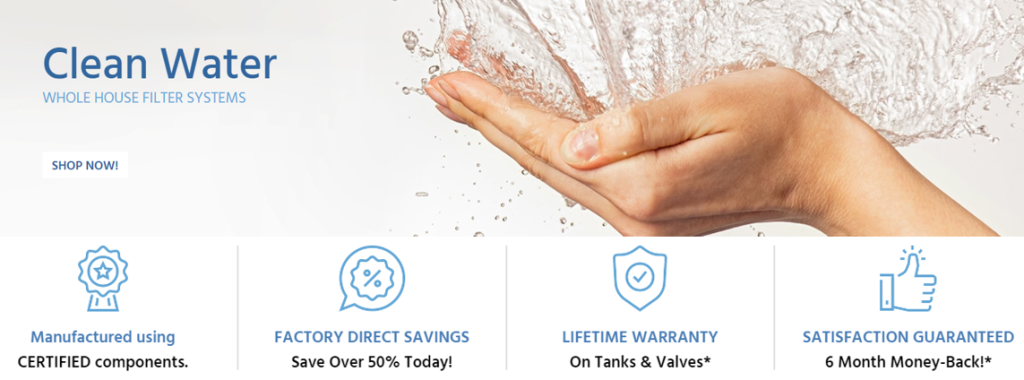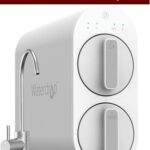They remove chlorine by using a process called ion exchange.
In the early days of water softening, people used to add salt to their water to remove the chlorine. However, this was not very effective and often left the water tasting salty. Today, water softeners use a process called ion exchange to remove the chlorine from water. This process is much more effective and does not leave the water tasting salty.
How Do Water Softeners Remove Chlorine?
Water softeners remove chlorine by ion exchange.

Water softeners are devices that are used to remove excess minerals and chlorine from water. There are a few different ways that water softeners can remove chlorine from water, but the most common method is through the use of an ion-exchange process.
Install a Home Water Filter & Get "Unlimited Safe Drinking Water" For Decades
Get Upto 55% Discount With a Lifetime Warranty & 6-Months Money Back Guarantee Free Shipping
SpringWell Water Filtration Systems: 100% American-Made & NSF Certified Water Filters and Water Softeners
The ion-exchange process works by exchanging the ions of the minerals in the water for the ions of the chlorine. This process is able to remove the chlorine from the water without removing the minerals. The ion-exchange process is not 100% effective, but it is able to remove a large majority of the chlorine from the water.
One of the biggest benefits of using a water softener is that it can help to extend the life of your appliances. Appliances that use water, such as washing machines and dishwashers, can often times be damaged by the minerals in hard water. The minerals can build up on the internal components of the appliances and cause them to work less efficiently. By using a water softener, you can help to prevent this build-up and extend the life of your appliances.
If you are interested in purchasing a water softener, there are a few things that you will need to keep in mind. First, you will need to decide what type of water softener is right for your home. There are two main types of water softeners: salt-based and potassium-based. Salt-based water softeners are the most common type of water softener on the market. They are typically less expensive than potassium-based water softeners and they are also easier to maintain.
Potassium-based water softeners are a good choice for those who have health concerns about salt. Potassium-based water softeners work by exchanging the potassium ions for the magnesium and calcium ions in the water. This exchange process helps to remove the hardness from the water without adding any salt.
Once you have decided which type of water softener is right for your home, you will need to select the right model. There are a variety of different models of water softeners on the market, so it is important to select one that will meet your specific needs.
One important factor to consider when selecting a water softener is the size of your home. If you have a small home, you will not need a large water softener. If you have a large home, you will need a water softener that is able to handle the amount of water that you use.
Another factor to consider when selecting a water softener is the type of water that you have in your home. If you have hard water, you will need a different type of water softener than if you have soft water. Hard water contains more minerals than soft water and requires a different type of ion-exchange process to remove the hardness.
Once you have considered these factors, you will be able to select the right water softener for your home. There are a variety of different models and brands of water softeners on the market, so you should have no trouble finding one that meets your specific needs.
How Do Water Softeners Work?
Water softeners work by exchanging the calcium and magnesium in hard water for sodium ions.
How do water softeners work?
Water softeners are devices that are used to remove magnesium and calcium ions from hard water. These ions can cause a number of problems, such as making it difficult to lather soap, leaving behind mineral deposits, and making water feel “hard.”
Water softeners work by exchanging the magnesium and calcium ions in hard water for sodium or potassium ions. This process is known as ion exchange.
There are two types of ion exchange water softeners: salt-based and salt-free.
Salt-based water softeners use sodium chloride (salt) to remove magnesium and calcium ions from hard water. The sodium ions are then exchanged for the magnesium and calcium ions.
Salt-free water softeners do not use sodium chloride. Instead, they use a process called reverse osmosis to remove the magnesium and calcium ions from hard water.
Reverse osmosis is a process where water is forced through a semi-permeable membrane. The semi-permeable membrane only allows water molecules to pass through, not magnesium and calcium ions.
The water that is filtered through the semi-permeable membrane is then passed through a carbon filter. The carbon filter removes any impurities that may be in the water.
Water softeners are an important part of many water treatment systems. They can help to prolong the life of your appliances, prevent mineral deposits, and make your water feel softer.
What Are The Benefits Of Using A Water Softener?
Water softeners remove minerals from water that can cause hard water.
If you have hard water, you may have experienced the frustration of dealing with spots on dishes, soap scum in the shower, and limescale buildup on plumbing fixtures. A water softener can eliminate these problems and leave your home feeling cleaner.
Hard water is water that contains high levels of minerals, such as calcium and magnesium. These minerals can cause a number of problems in your home, including:
• Spots on dishes and glasses: When hard water dries, the mineral deposits are left behind as unsightly spots.
• Soap scum: Soap doesn’t lather as well in hard water and can leave a film on your skin and in your tub or shower.
• Limescale: This chalky buildup can clog pipes and reduce the efficiency of water-using appliances.
A water softener is a device that removes these minerals from your water, leaving it “soft.” The softened water will not only eliminate the spots, soap scum, and limescale, but it will also make your hair and skin feel cleaner and your laundry brighter.
If you’re considering a water softener for your home, here are a few things to keep in mind:
• Maintenance: Water softeners require regular maintenance, such as adding salt to the unit on a regular basis.
• Cost: Water softeners can range in price from a few hundred dollars to a few thousand, depending on the type and size of unit you choose.
• Installation: Some water softeners can be installed by a do-it-yourselfer, but others require the services of a plumber or other professional.
If you’re fed up with hard water problems, a water softener may be the solution you’re looking for. Softened water can make a big difference in the feel of your home and the longevity of your plumbing.
How Often Should I Use My Water Softener?
You should use your water softener as often as you need to.
Assuming you have a water softener, you should regenerate the unit every 3-4 days.
A water softener is a appliance that is used to remove hardness minerals from water. The water softener will have a resin bed that the water flows through. The hardness minerals will stick to the resin beads and the water will become soft.
The water softener will need to be regenerated every 3-4 days. This is when the water softener will clean the resin beads and remove the hardness minerals. The regeneration process will use salt and water to clean the resin beads.
You will know it is time to regenerate the water softener when the water pressure starts to drop or you start to see hardness minerals in your water.
It is important to regenerate the water softener on a regular basis to prevent the resin beads from becoming saturated with hardness minerals. If the resin beads become saturated, the water softener will not be able to remove the hardness minerals from the water.
How Much Chlorine Does A Water Softener Remove?
A water softener removes all of the chlorine from the water.
Do you have a water softener? If you do, you probably have chlorine in your water. But how much chlorine does a water softener remove?
Chlorine is added to water to kill bacteria. It’s effective, but it can also be harsh on your skin and hair. A water softener removes some of the chlorine from your water.
The amount of chlorine removed depends on the type of water softener you have. Some remove more chlorine than others. If you’re not sure how much chlorine your water softener removes, you can check the manufacturer’s website or ask a plumber.
Here’s an example. Let’s say you have a water softener that removes 50% of the chlorine from your water. If your water has 1 ppm (part per million) of chlorine, your water softener will remove 0.5 ppm of chlorine.
It’s important to note that water softeners don’t remove all of the chlorine from your water. If you’re concerned about the chlorine in your water, you can have your water tested. A water test will tell you the exact amount of chlorine in your water.
FAQ
What Are The Signs That I Need A Water Softener?
How Can I Tell If My Water Softener Is Working Properly?
What Should I Do If I Think My Water Softener Is Not Working?
I’m Thinking About Getting A Water Softener. What Do I Need To Know?
Is There Anything Else I Need To Know About Water Softeners?
Conclusion
Water softeners remove chlorine from water by using a process called ion exchange. In this process, the positively charged ions of the chlorine are exchanged for the positively charged ions of the water softener. This leaves the water with a higher concentration of chloride ions, which are then removed from the water by the softener’s resin bed.
If you still have any questions about how water softeners remove chlorine, feel free to comment below.


